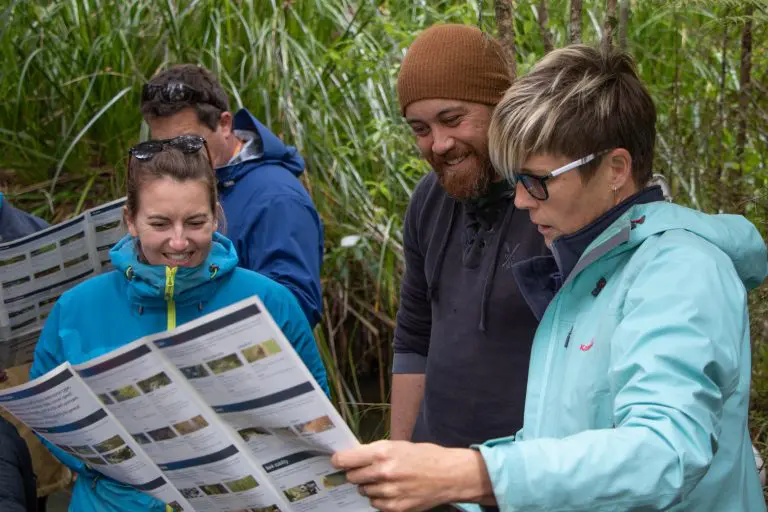After an invigorating week on the inaugural BLAKE Inspire for Teachers programme, Hawke’s Bay teacher Ihaia Rollo has returned to the classroom with huge plans.
Ihaia, 33, teaches Years 3 and 4 (six- to eight-year-olds) at Te Kura Kaupapa Māori o Te Wananga Whare Tapere o Takitimu. He joined 28 other teachers from around New Zealand on the BLAKE Inspire programme in the first week of the September school holidays. The Auckland-based course challenged participants to create an Action Plan aimed at increasing the emphasis on conservation in their school community.
The school has grown rapidly to 130 students, split across two small urban sites. The new school will bring the whole student body together on one larger campus. The new kura will have more green space and easy access to a local river.
Ihaia has persuaded colleague Warena Wainohu, who also attended the BLAKE Inspire course, to help him bring the Action Plan to life. The pair have a long list of jobs to complete this term, and beyond.
Ihaia’s Action Plan is an ambitious blueprint.
“I said I was going to do a lot of things!”
Ahead of the school relocation, students will be researching local flora to determine which natives should be planted at the new site. Ihaia wants the school to install a weather station and develop water monitoring tools so students can assess the health of local rivers. A vege garden will be built to develop better understanding of horticulture and health.
And all of this will be transferred to the new school, along with worm farms.
There will also be a strong focus on building key relationships. Ihaia hopes to re-establish networks with the Enviro-Schools programme, connect with local nurseries, and share his conservation education goals with local iwi.
Ihaia says the school is very strong in Mātauranga Māori – teaching built around traditional Māori concepts and outlooks – so students already feel a strong link to the earth.
“They have a really strong awareness of what their impact can be on Papatūāanuku.”
But the school does not have a trained science teacher so that role is either outsourced, or generalist classroom teachers learn the NCEA curriculum ahead of teaching it.
The Action Plan sets out a goal to identify a teacher on staff who would be willing to upskill so students could have access to a dedicated science specialist teacher.
Aside from the Action Plan, Ihaia says his students will notice an immediate change in his teaching style as a result of the BLAKE Inspire for Teachers programme.
“We will be spending a lot more time outdoors, getting them all connected to outside.”
Ihaia, 33, was raised in Hawke’s Bay. He completed a Bachelor of Arts in Māori (hons) in 2005 and soon after left New Zealand to work in the mining industry in Western Australia. He spent 10 years in drill and blast roles but was eventually drawn home to share his love of Te Reo Māori.
“I’ve always been passionate about teaching the language and making people aware of the culture [but] I worried I wasn’t good enough.”
Working in the mines brought him out of his shell and he grew braver with age. Eventually he decided to go for it.
He returned to New Zealand, set up an online private tutoring business for aspiring Te Reo speakers, and set about gaining his teaching diploma through Massey University. The role at the kura is his first job and he’s quickly found his love for teaching extends beyond his original goal of sharing the language with a new generation. He is passionate about developing the children’s interest in the world around them.
“When you teach something to a kid, and they repeat it back to you two years later, it just blows you away.”
Ihaia says, as a new teacher, he has to attend a lot of professional development courses – some more beneficial than others. He was excited by how much he learnt on the BLAKE Inspire for Teachers course – information and skills that will enable him to increase the amount of environmental education he can offer his students.
“It was an awesome experience. I wasn’t expecting to take away so much from the course. The conversations with the other teachers were mind-blowing in themselves, to hear what they were doing in their own schools already.
“I knew who Sir Peter Blake was and what he had accomplished. I didn’t realise how big the legacy was and what he had left behind and how many people are continuing his work.”
The programme is being funded by the Ministry of Education, with support from Ministry for the Environment.
The week-long course sees teachers teamed with world-leading scientists, environmental leaders, experts in their fields and businesses to learn about topical issues such as climate change, renewable energy, biodiversity and ocean and freshwater health.
The inaugural course started at Orakei Marae with discussions about Mātauranga Māori, as part of BLAKE’s commitment to incorporate Te Ao Māori in to all its courses. The teachers looked at how Auckland’s stormwater issues are impacting on the lives of iwi. The teachers visited Air New Zealand, Genesis and Villa Maria to look at the ways companies can reduce their impact on the environment. Minister for Climate Change James Shaw stopped in to discuss what it means to be aware of the environment, and the group visited Tiritiri Matangi to understand the effort required to override human impacts.
Ihaia especially enjoyed learning to analyse a square meter of rocky shore beach environment and learning how to test the quality of water. He could see these activities becoming part of his new teaching repertoire.
“It’s fed us all of this information that we can take in to our classrooms.”
BLAKE CEO, James Gibson, says BLAKE’s newest programme was designed to impact young New Zealanders.
“Sir Peter Blake wanted to reach every classroom in New Zealand to inspire our rangatahi to protect the environment. BLAKE Inspire for Teachers is a new way of achieving this,” Gibson says.
“By teaching the teachers and developing both their knowledge and confidence so they can integrate environmental education into their own school programmes means we’re reaching more and more children.”


